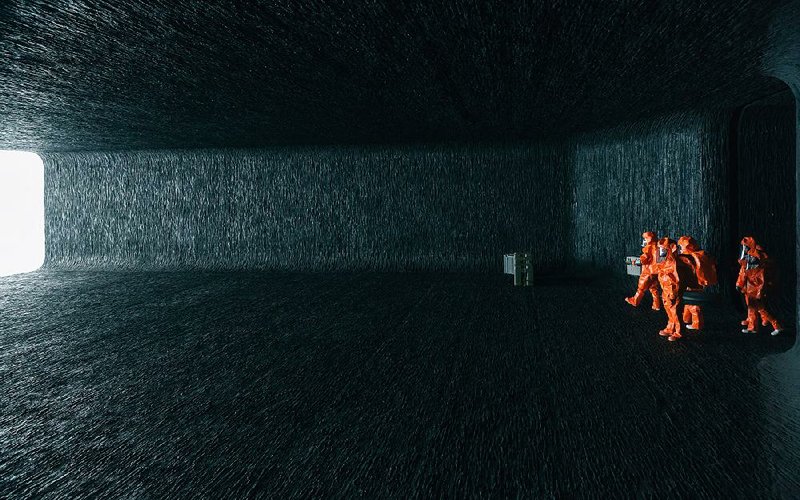French-Canadian director Denis Villeneuve has a penchant for intentionally messing with his audience.
Prisoners, the first film he made with a major studio and strong Hollywood cast (including Hugh Jackman, Viola Davis and Jake Gyllenhaal), puts the audience in the dubious moral position of sanctioning torture as a means to an end -- as a desperate father attempts to find his abducted daughter by taking the law in his own hands. It's a version of Taken in which we aren't given ethical amnesty.
Arrival
88 Cast: Amy Adams, Jeremy Renner, Forest Whitaker, Michael Stuhlbarg, Mark O’Brien, Tzi Ma, Abigail Pniowsky, Julia Scarlett Dan
Director: Denis Villeneuve
Rating: PG-13, for brief strong language
Running time: 1 hour, 56 minutes
His next film, the confounding Enemy, also starring Gyllenhaal, plays a (very) loose adaptation of Dostoevsky's novel The Double, via Jose Saramago's updated version, The Duplicated Man, about a young professor who encounters what appears to be his own doppelganger, only one far more assertive and emotionally aggressive than himself, with Villeneuve almost gleefully leaving his audience in bewilderment.
Last year's Sicario, a seemingly straightforward exploration of our military failings in the drug war with Mexico, still posits as our protagonist a strong and capable woman (Emily Blunt), who is shown, like the audience, not to even begin to understand the depth of depraved twistiness in our national drug policies.
Given such a long and illustrious history of upending his audience's expectations, it should come as no surprise that Arrival, starring Amy Adams as a linguist tasked with trying to communicate with aliens whose giant obelisklike ships have descended over the Earth, isn't exactly playing it straight, either. Still, employing what might be considered an extravagant misdirection, the film is of an increasingly rare breed: an adult science-fiction story with nary a blaster or warp drive in sight. It's also yet another Villeneuve film that leads you to an almost mandatory debate after its viewing.
Adams plays Dr. Louise Banks, a sad and lonely woman who experiences extreme tragedy involving her young daughter. She teaches at a college and lives alone in a beautiful, if forlorn, house overlooking a lake. When a dozen large alien ships scattered about the globe suddenly descend, hovering just over the Earth's surface, she is eventually dispatched to try and translate the large, slightly gooey, squidlike aliens' form of communication involving symbols created in what appears to be smoky ink and determine whether they come in peace or for global conquest.
As Banks begins engaging the aliens, learning how to communicate with them, tensions increase in other countries, especially China, led by Gen. Shang (Tzi Ma), an autocrat who sees in the perceived alien threat a way to promote himself as a demonstrative world leader. The general continues to advocate disengaging with diplomacy and employing nuclear aggression against the aliens with increasing fervor.
Banks, along with Ian Donnelly (Jeremy Renner), a physicist recruited by the military to help with the operation, must abide by the command of Col. Weber (Forest Whitaker), who pushes them into an ever-shortening window of time. The trouble is, as Banks is at pains to demonstrate, translated communication is an incredibly delicate and difficult operation -- in one memorable exchange with the colonel, she points out that to a creature unfamiliar with human thought, the difference in meaning between the word "tool" and "weapon" -- while crucial -- is almost impossible to impart without many layers of previous understanding in place.
To begin with, basing an alien-invasion film on the concept of linguistic difficulty is a remarkably staid and fascinating approach to take by screenwriter Eric Heisserer (based on a short story by Ted Chiang), which plays very well with Villeneuve's relentlessly sober -- you might even say grim -- visual style. Too often, science in movies is used as just another narrative device, pushing the story along without any sort of genuine scientific method. (In similar fashion, scientists themselves are very often portrayed as either pontificating egg-heads or wildly unscientific egoists.) But here we are given at least a hint of the subtle beauty and extreme complexity of interactive linguistics.
This is not a film to placate fidgeting teens waiting for an action-studded climax; instead, it's pointedly measured and disciplined in its pacing. The scene leading up to Banks' first contact with the aliens -- traveling vertically into the belly of their ship, first on a hydraulic lift then by a reversal of gravity -- is extremely precise and admirably restrained. Villeneuve, along with his accomplished cinematographer, Bradford Young, have created a world just believably tragic and chaotic enough to read as painfully realistic, which is quite a trick when you're dealing with a subject so fantastical to begin with. (In its relentless dourness and cold appraisal of humans and technology, it resembles very much the tone of Ridley Scott's classic Blade Runner, no doubt a major selling point in having Villeneuve tapped to helm the forthcoming sequel, Blade Runner 2049.)
In fact, Villeneuve's attention to detail and gift for visual thematics are present from Arrival's opening shot: a slow crawl down the rigid vertical lines of the wood ceiling in Banks' forlorn lake house, suggesting an irrepressible push forward into something neither we, nor the characters, can quite comprehend until the end of the film.
The visual and narrative tricks Villeneuve employs, the manner in which the film cheats off of the audience's perception by essentially lying to them on a key central plot point, cannot be discussed due to the obvious spoiler potential, but suffice it to say, you will either leave the film mystified, deeply moved or irritated at being blatantly tricked -- or I suppose, some combination thereof.
However Arrival leaves you, it's clear Villeneuve has once again found an arresting vehicle for his particular sensibilities. Whether his forbidding worldview will strike you as an achingly realistic drama or an overly angsty downer largely depends upon what you go to movies for in the first place.
MovieStyle on 11/11/2016


